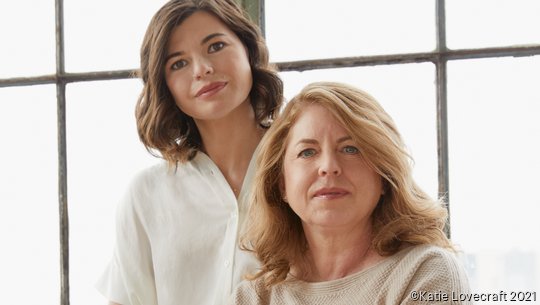
The mother-daughter entrepreneurs behind Little Otter are trying to change the way families think about mental health – one child at a time.
Technically, Little Otter’s corporate headquarters address is in California, though its CEO, Rebecca Egger, moved to her hometown of Durham two years ago to run the company with her mother, its chief medical officer, Helen Egger.
“It was why are we in this tiny apartment where we don’t get to go outside?” Rebecca Egger said of San Francisco. “Also, me and my mom are running this company together, so it’s much better for us to be in the same location.”
The idea for Little Otter, a comprehensive platform that supports the mental health of children and their families, had been circulating for decades – perhaps her whole life.
Rebecca grew up watching her mom’s career. Helen Egger is a child psychologist and well-known research scientist in the early childhood mental health space. For six years, she was division chief for child psychiatry at Duke University School of Medicine.
Everywhere they went, when people found out what Helen Egger did, they had questions about their own kids.
“They would ask, is my child normal, is this typical behavior … if not, what do I do and then where do I go to get help and support?” Rebecca Egger remembers. “It was just clear from a very young age that there was massive amounts of need, of people asking questions about their child’s mental health.”
“By the time I was 30, we really felt like we had been talking about this for years and years and years,” she said.
In the meantime, Rebecca Egger, had also built quite the career. A graduate of the North Carolina School of Science and Math, she went to UNC-Chapel Hill for computer science and took on product roles at companies such as Palantir Technologies.
In 2017, she took on a product leadership role at the Chan Zuckerberg Initiative’s infectious disease division, a San Francisco organization dedicated to advancing human potential through technology and impact investing. There she worked with scientists and physicians and saw how an organization could make a big impact.
Going all in on childhood mental health
But the idea behind Little Otter kept festering. Rebecca Egger started consulting in the background, looking at the market and the opportunity.
“I got more excited. I said, 'Actually, I want to quit my job,'” Egger said. “I want to do this.”
Helen Egger was passionate about creating the startup, so much so that she decided to leave a tenure track position.
“Despite the incredible science and work that has happened over the past 30 years, a lot of really high quality mental health care has not reached beyond the walls of academia and really reached families,” she said. New solutions won’t come from inside a lecture hall. “It comes from creating an innovative platform and an innovative approach to the care of kids and families.”
By bringing Rebecca Egger’s technical expertise with Helen Egger’s decades-long experience, Little Otter was born in 2020. The goal was to address mental health challenges in kids. One in six children have a diagnosable mental health disorder, according to the company. And 50 percent of mental health disorders appear before the age of 14.
The Little Otter platform – which includes an online child therapy app – offers care via licensed therapists, psychiatrists and parent specialists, as well as real-time support services.
Backers have bought into the concept. The firm has raised $26 million altogether from institutional investors, angels, friends and family. Including about 70 clinicians, the company has about 100 people.
Rebecca said the goal is to get in-network with more insurance partners to increase access. And the company is starting to look at applications in prenatal and maternal mental health.
“How do we support moms and families before kiddo even arrives?” she said.
Helen said it’s the right time for growth – particularly as the pandemic exacerbated mental health issues across the board.
“Our greatest competitor is people not knowing that young children suffer from mental health disorders and that they can be treated,” she said, adding that much of the industry focus has been on teenagers. “But if we address these problems early, we can have a much bigger impact.”